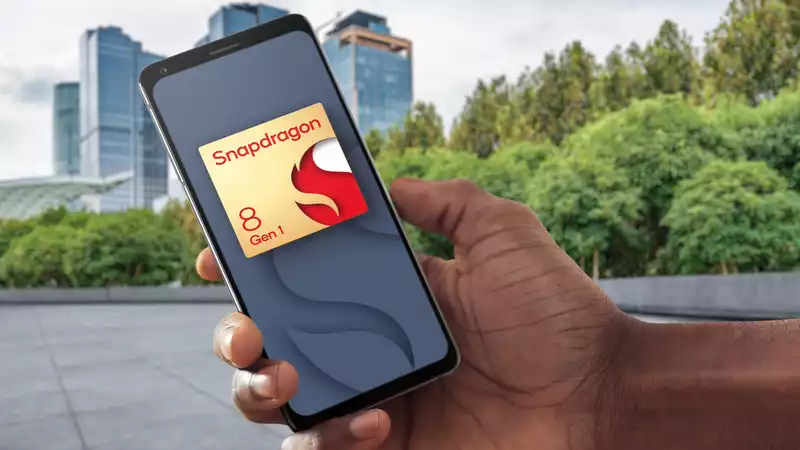The Snapdragon 8 Gen 1 system-on-chip, which will be in many top Android phones in 2022, debuted just last week, but some early benchmarks detailing the chipset's performance have already been released. And it doesn't look like the iPhone 13 has much to worry about when it comes to future Android phones outperforming the iPhone 13.
Benchmark results published on several tech sites show that the Snapdragon 8 Gen 1 improves on the performance of previous Qualcomm chipsets, but still falls short of the A15 Bionic processor found in the latest iPhone.
PCMag, XDA Developers, and BGR are among the publications that have tested the Snapdragon 8 Gen 1 on reference devices provided by Qualcomm and published their results today (December 7).
The numbers will be of interest to fans of Android phones, as Qualcomm's top-of-the-line silicon is typically found in many major flagships. For example, Samsung's Galaxy S22 is expected to be powered by the Snapdragon 8 Gen 1, and the co-founder of OnePlus has already confirmed that the upcoming OnePlus 10 will run on Qualcomm's latest chip.
Results from Geekbench 5, a synthetic benchmark that reflects general performance, were fairly consistent across the board, so we'll use PCMag's results here. In this test, the Snapdragon 8 Gen 1 had a single-core score of 1,235 and a multi-core score of 3,837. [These numbers represent a slight improvement over the Snapdragon 8 Gen 1's predecessor, the Snapdragon 888. The Asus ROG Phone 5, one of the best gaming phones tested this year, recorded Geekbench 5 scores of 1,125 in the single-core test and 3,721 in the multi-core portion The Snapdragon 8 Gen 1 devices tested by PCMag beat these results by 10% and 3%, respectively.
Similarly, reference devices powered by the Snapdragon 8 Gen 1 outperformed the Samsung Galaxy S21 Ultra (1,123 and 3,440) and OnePlus 9 Pro (1,126 and 3,685) with the Snapdragon 888 chipset The Pixel 6 Pro with the Google-designed Tensor processor lagged far behind the Snapdragon 8 Gen 1 in the Geekbench 5 results, with a single-core score of 1,027 and a multi-core score of 2 1,760.
This is good news for the Snapdragon 8 Gen 1, even if the results do not match the 20% speed increase that Qualcomm is promising for the Kryo CPU in its chipset. The bad news is that Apple's A15 Bionic continues to dominate Snapdragon in this performance metric.
Testing the iPhone 13 Pro Max this fall yielded a single-core result of 1,720 and a multi-core score of 4,549. in XDA's results, the Snapdragon 8 Gen 1 barely outperformed the Snapdragon 888 reference device the magazine had previously tested. Snapdragon 8 Gen 1 barely exceeded the results of the Snapdragon 888 reference device previously tested by the magazine.
So what do we think? First, these Snapdragon 8 Gen 1 test results were generated on a reference device, not a shipped phone with optimized performance. Qualcomm has also been upfront about the fact that their silicon is designed to produce more sustained performance, not for burst performance as measured by Geekbench. In other words, while results from benchmarks are useful for comparing one phone to another, they do not necessarily reflect real-world performance. [In its GFXBench GPU benchmark, PCMag reports that the Snapdragon 8 Gen 1 device scored higher than any other iPhone or Qualcomm phone in tests using the new Vulkan API. (We do not typically run GFXBench when testing phones, so we do not have our own numbers to compare to those produced by the Snapdragon 8 Gen 1.)
According to Qualcomm, the Snapdragon 8 Gen 1's Adreno GPU is optimized for Vulkan. The chipmaker said the new GPU is 30% faster and 25% more power efficient than the one produced by the Snapdragon 888.
Meanwhile, XDA ran the MLPerf benchmark, which measures artificial intelligence performance on Qualcomm's new chipset; according to XDA, Snapdragon 8 Gen 1 devices outperform Snapdragon 888, Dimensity 1100, and Exynos 2100 silicon and scored the highest on the computer vision and natural language processing inference benchmarks compared to devices powered by the Snapdragon 888, Dimensity 1100, and Exynos 2100 silicon.
At Qualcomm's Snapdragon 8 Gen 1 launch a week ago, it seemed that while improved performance is certainly the chipmaker's goal, the real improvements in next year's Android phones will be in the camera, gaming, and AI experiences that the new chipset can enable.
While Apple looks to maintain its speed crown, Qualcomm is clearly betting that other areas are more important to winning the mobile processor race.
.









Comments